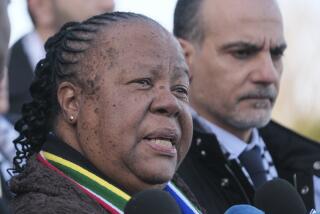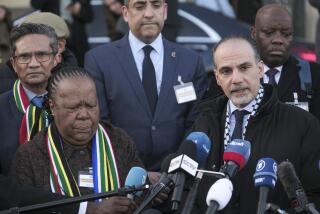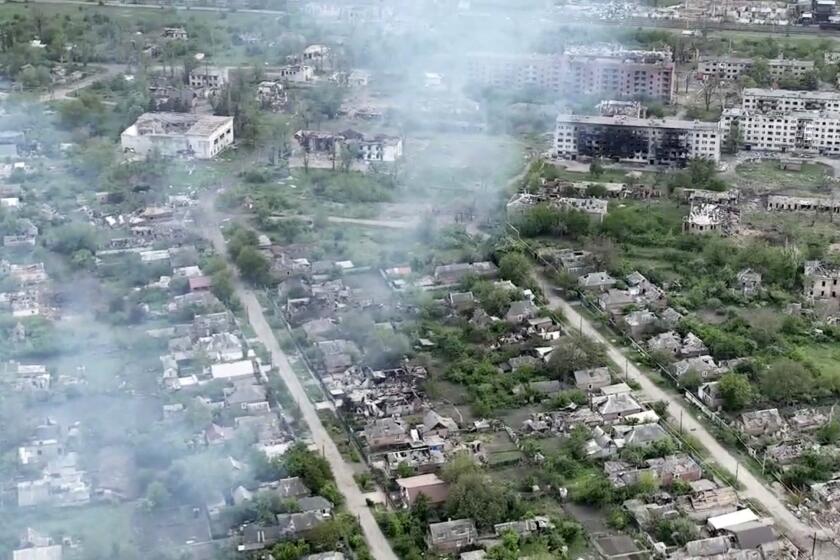Obama’s Nelson Mandela predicament
JOHANNESBURG, South Africa — President Obama, asked how Nelson Mandela’s illness might alter a much-anticipated visit to South Africa, paused for a long moment, bit his lip and spoke slowly.
“We’ll see what the situation is when we land,” the president told reporters aboard Air Force One as he flew Friday from Senegal to South Africa on the third day of his Africa tour.
The deliberation in Obama’s comments reflected the White House’s cautious approach to the diplomatic predicament: How to be a good guest when your host is preparing for loss and distracted by sadness.
As Obama arrived, South Africa and much of the world was focused on the health of Mandela, the 94-year-old elder statesman and iconic civil rights leader, who remained in critical condition.
The Obamas will not be visiting Mandela in the hospital, but will meet with family members Saturday, a White House official confirmed. The decision was made “out of deference to Nelson Mandela’s peace and comfort and the family’s wishes,” the official said.
Still, Obama forged ahead with his first visit to this country as president, three days filled with speeches, meetings with leaders and young people, and tourism.
Obama was not scheduled to visit Mandela, and he suggested Friday that was unlikely to change. “I don’t need a photo op,” he said. “And the last thing I want to do is to be in any way obtrusive at a time when the family is concerned about Nelson Mandela’s condition.”
Deference to the family has been a theme in official comments on the dynamics of the visit. The White House is mindful of the perils of appearing to take advantage of Obama’s presence in South Africa or meddling in private moments. Members of Mandela’s large and sometimes divided family — a feud over where Mandela should be buried has reportedly wound up in the courts — have criticized leaders they believe have tried to exploit a frail Mandela’s image for their own political gain.
Still, Obama will probably seek to find delicate ways to demonstrate his sensitivity to the moment. There are obvious opportunities. The president is to visit Robben Island, where Mandela was imprisoned during his decades-long fight against apartheid, and deliver a speech in Cape Town that is expected to laud Mandela’s life.
“I think that the main message we’ll want to deliver, if not directly to him but to his family,” Obama said Friday, “is simply our profound gratitude for his leadership all these years and that the thoughts and prayers of the American people are with him and his family.”
Obama is likely to strive for humility in his remarks in South Africa. White House aides said they were taking care not to appear to be seizing a mantle. The symbolic linkage of the first African American president of the United States and the first black president of South Africa is powerful, but the personal ties between the men are few.
They met just once, in 2005, when Obama was a junior senator from Illinois. The men have spoken briefly by phone since Obama became president. Obama did write an introduction to a collection of Mandela’s writings published last year.
Obama regularly credits Mandela and the anti-apartheid movement for drawing him into political activism.
Since beginning his weeklong Africa tour, Obama has twice spoken of Mandela’s influence on his life — and both times emphasized that he had no special claim to Mandela’s legacy.
“He’s a personal hero; I don’t think I’m unique in that regard,” Obama said Thursday during a news conference in Dakar, Senegal, his first stop on the tour. “I think he’s a hero for the world.”
kathleen.hennessey@latimes.com
More to Read
Start your day right
Sign up for Essential California for news, features and recommendations from the L.A. Times and beyond in your inbox six days a week.
You may occasionally receive promotional content from the Los Angeles Times.







